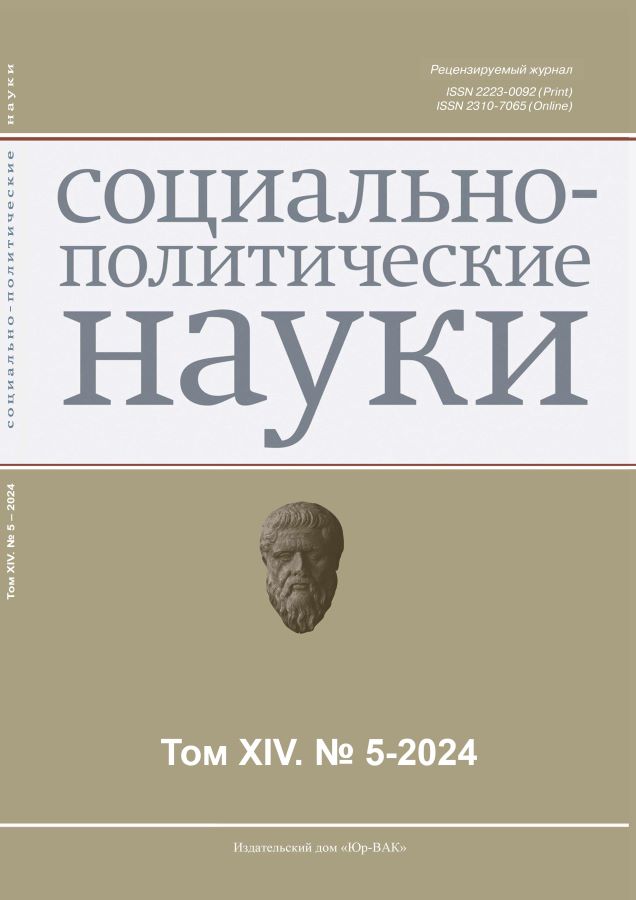The phenomenon of M.V. Lomonosov in the history of the relationship between science and religion
- Authors: Dotsenko A.A.1, Arinin E.I.1
-
Affiliations:
- Vladimdir State University named after Alexander and Nikolay Stoletovs
- Issue: Vol 14, No 5 (2024)
- Pages: 191-197
- Section: Philosophical anthropology, philosophy of culture
- URL: https://journals.eco-vector.com/2223-0092/article/view/655542
- DOI: https://doi.org/10.33693/2223-0092-2024-14-5-191-197
- EDN: https://elibrary.ru/STAFOS
- ID: 655542
Cite item
Abstract
M.V. Lomonosov is one of the key figures in Russian studies of the relationship between science and religion in the 18th century. The text analyzes the ambivalent picture of the interactions between the synodal church and the academic community as the “truth of faith” and the “truth of the academy”, which included both contradictions and a deep dialogue. These relations received a whole spectrum of interpretations in different periods of Russian history, from the “mutually exclusive confrontation of science and obscurantism” to the prospect of a sincere dialogue between “two daughters of one Supreme Parent”. The article shows the desire of a number of Soviet-era authors to reduce the worldview of the “father of Moscow University”, who understood that “the more its mysteries one’s mind comprehends, the greater the joy his heart feels”, to such schematic stereotypes as “atheist”, “convinced materialist”, “consistent supporter of natural-scientific materialism”, “deist”, “mechanical materialist”, whose “materialism was active, militant”, based on the cliché of “the irreconcilability of science and religion”. Post-Soviet descriptions are more correct, reasonably believing that a “good and true Christian” can also be a “great scientist-encyclopedist”.
Full Text
About the authors
Artem A. Dotsenko
Vladimdir State University named after Alexander and Nikolay Stoletovs
Author for correspondence.
Email: artyom.a.dotsenko@gmail.com
Scopus Author ID: 57202510028
applicant, Department of Philosophy and Religious Studies
Russian Federation, VladimdirEvgeni I. Arinin
Vladimdir State University named after Alexander and Nikolay Stoletovs
Email: eiarinin@mail.ru
Scopus Author ID: 37060239800
Dr. Sci. (Philos.), Professor, Head, Department of Philosophy and Religious Studies
Russian Federation, VladimdirReferences
- Andryakova T.V. Worldview of young people in Modern Russia (religious aspect): Dis. ... of Cand. Sci. (Philos.). Arkhangelsk, 2004. Pp. 11, 14.
- Arinin E.I. Orthodoxy and science (based on the work of M.V. Lomonosov). In: State. Society. Church: Proceedings of the international scientific conference (Vladimir, November 18, 2020). Vladimir: Arkaim, 2020. Pp. 105–119.
- Arinin E.I. Religion and M.V. Lomonosov. In: Mikhail Lomonosov. Pomor Encyclopedia. Arkhangelsk: NArFU, 2022. P. 429.
- Burmistenko I. Lomonosov and religion. Anti-Religiousist. 1938. No. 3. Pp. 29–41. (In Rus.)
- Vladimirov P.V. Lomonosov. In: Brockhaus and Efron Encyclopedic Dictionary. Vol. XVIIA (34). Ledie–Loparev. St. Petersburg: Semenovskaya Typographical Museum (I.A. Efron), 1896. Pp. 939, 941, 942, 943.
- Dukhanin V., priest. The secret world of Orthodoxy. 4th ed., cor. Moscow: Moscow Patriarchate Publishing House, 2009. 536 p.
- Kaleda G., archpriest. The founder of Russian apologetics Lomonosov. In: Priest Gleb Kaleda – scholar and pastor. Moscow: Publishing House of the Conception Monastery, 2007. Pp. 600–605.
- Katunina N.S., Dotsenko A.A., reader. Thematization of the religious-scientific picture of the world. In: The legacy of the Christian church: Theology, history, culture. Materials of the V All-Russian scientific and theological conference dedicated to the 25th anniversary of the revival of the Vladimir Theological Seminary (Vladimir, March 16–17, 2023). Vladimir: Publishing and Printing Company “Transit-ICS”, 2023. Pp. 94–102.
- Lomonosov // Great Soviet Encyclopedia. 3rd ed. Vol. 15. Moscow: Soviet Encyclopedia, 1974. Pp. 8, 10.
- Lomonosov // Great Soviet Encyclopedia. Vol. 25. Moscow: Big Soviet Encyclopedia, 1954. Pp. 375, 377, 383.
- Lomonosov M.V. Complete set of works. Vol. 2: Works on physics and chemistry 1747–1752. Moscow: Publishing House of Academician Sciences of the USSR, 1951. 727 p.
- Lomonosov M.V. Collection of articles 1711–1911. V.V. Sipovsky (ed.). St. Petersburg: St. Petersburg Printing House of Partnership of Printing and Publishing “Trud”, 1911.
- Lomonosov M.V. The appearance of Venus on the Sun, observed at the St. Petersburg Imperial Mayan Academy of Sciences on the March 26th day of 1761. In: Complete Works. Moscow; Leningrad: USSR Academy of Sciences, 1950–1983. Vol. 2: Works on physics, astronomy, and instrumentation, 1744–1765. Moscow; Leningrad: USSR Academy of Sciences, 1955. Pp. 361–376.
- Menshutkin B.N., Vyropaev B.N., Gudziy N.K. Lomonosov. In: Great Soviet Encyclopedia. Vol. 37. Moscow: Soviet Encyclopedia, 1938. Columns. 373, 376, 377, 379.
- Moryakov V.I., Bogatova T.V. Lomonosov. In: New Russian Encyclopedia. Vol. IX (2), Moscow: Encyclopedia, 2012. Pp. 519, 521.
- Mumrikov O.A. “Truth and Faith Are Two Sisters”: An unlearned lesson (reflections on the 300th anniversary of M.V. Lomonosov’s birth). Bulletin of PSTGU. Series IV: Pedagogy. Psychology. 2012. Issue 2 (25). Pp. 59–60, 68. (In Rus.)
- An experiment in a Historical Dictionary of Russian writer. Collected by Nikolai Novikov from various printed and handwritten books, reported news, and verbal traditions. In St. Petersburg in 1772.
- Pekarsky P.P. History of the Academy of Sciences. Vol. II. St. Petersburg: Publication of the Department of Russian Language and Literature of the Imperial Academy of Sciences, 1873.
- Word on the origin of light, presenting a new theory of colors at a public meeting of the Imperial Academy of Sciences on July 1, 1756, delivered by Mikhail Lomonosov. Published in St. Petersburg at the Imperial Academy of Sciences. P. 3.
- Sukhov A.D. Lomonosov. In: New philosophical encyclopedia. Vol. 2. Moscow: Mysl, 2010. P. 450.
- Tazhurizina Z.A. Lomonosov. In: Religious studies. Encyclopedic dictionary. Moscow: Academicheskiy Proekt, 2006. P. 585.
Supplementary files









